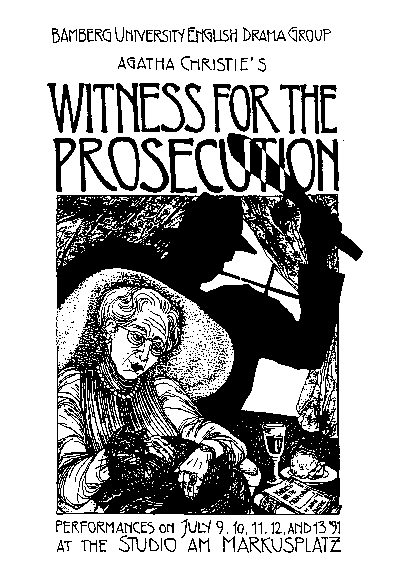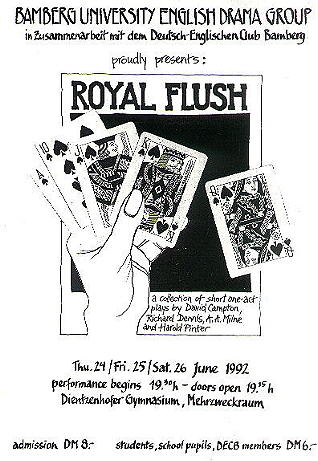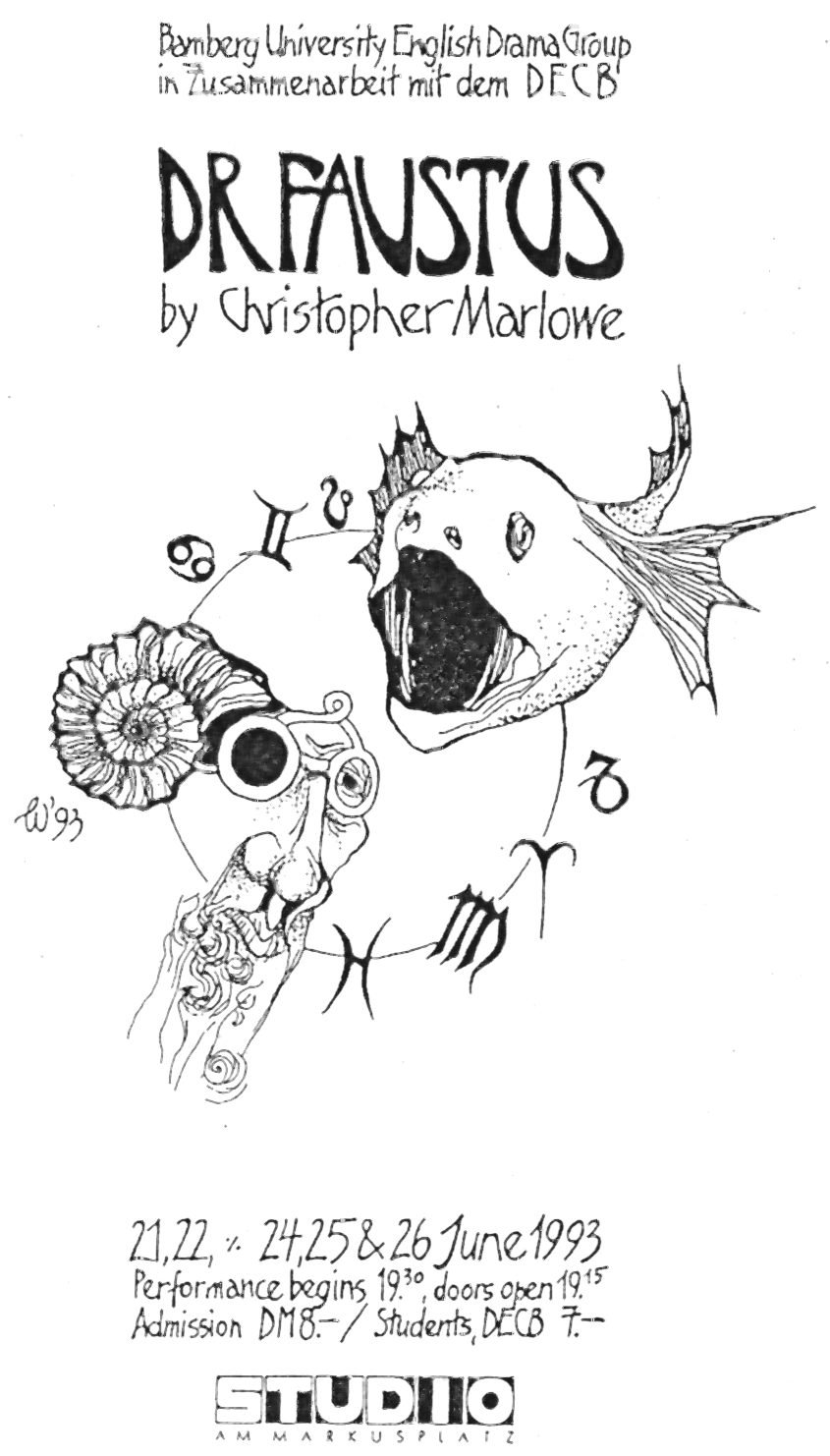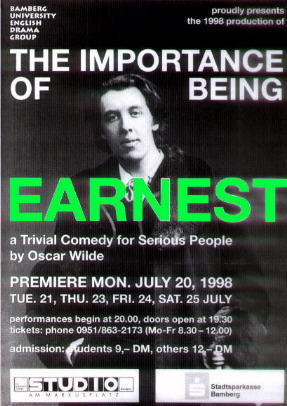A New Home: 1991 - 1999
The 1990s saw a collaboration between the BUEDG and Bamberg's ETA Hoffmann Theater: we were able to produce our plays in their "Studiobühne am Markusplatz", a small but well-equipped second stage that was established alongside their regular house at Schillerplatz by their former theatre manager, Rainer Lewandowski. We were also lucky enough to draw on their technical expertise, namely that of Wolfgang Bauschmid and Joseph Weyrauther, who ever so patiently and charmingly introduced us to the professional lighting and sound equipment there. The ETA's back office was also very supportive, in particular Stephan Dzierdzawa. This phase brought forth some celebrated productions, some of which are portrayed below.
1991: Agatha Christie's Witness for the Prosecution
|
One of the most famous plays by Agatha Christie, Witness, allowed us to use the full potential of our newly found home, the "Studiobühne", and employ a formidable cast (nineteen people in total). It also marked Dame Agatha Christie's 100th birthday (a little belatedly, but never mind). The play's director, Mike Claridge, wrote in the programme: "When Dame Agatha Christie was born, just over one hundred years ago - on 15 September 1890 - no-one could have predicted hat her later literary output would affect millions all over the world, that her work would be published in over 45 languages, that her 78 novels and short stories and 19 plays would sell more than a billion copies - indeed, that she would one day be described as the world's best-selling writer. |
 |
1992: A Royal Flush
|
This production consisted of five humoristic trump cards: four one-act plays by Harold Pinter, Richard Dennis, A. A. Milne and David Compton, enriched by sketches and introduced by our fifth trump card, the Host. With another collaboration with Bamberg's "Deutsch-Englischer Club", we returned to our roots, playing in a local school and turning limited resources into an entertaining evening through everyone's abundant joy of performing.
|
 |
1993: Christopher Marlowe's Doctor Faustus
|
Admittedly Mike Claridge's long-held wish, this elaborate production was a challenge on many fronts: in terms of literary subject matter (in the home country of the myth of Faust you really want to get it right...), logistically (this time we had a cast of over twenty, still with many costume changes etc.), linguistically... Rehearsal work was demanding, gratifying and, ultimately, well worth the effort, and resulted in a sparkling, well-rounded production that had a formidable Sabine Taronna playing the good (?) doctor surrounded by a host of devilish creatures, deadly sins, majesties, clergy, apparitions - but all students, of course. Here is an extract from the programme: "Like the doctor, we are faced daily with decisions that must be taken, and sometimes simply put them off until it is too late. Like Faustus, we sometimes prefer to ignore the consequences of inaction (the former Yugoslavia?), of deliberate self-delusion ("There are no Neo-Nazis in the former West Germany"), of a conscious disregard of what the future could bring ("When I finish my Abitur / university exams, I'll find some job somewhere, no problem"); like Faustus, we tend to avoid responsibility and refuse to accept the blame for any mistakes that we have made ("It's all the fault of the Government / other countries / my neighbour / my parents / my teacher / today's young people / foreigners")."
|
 |
1994: G. B. Shaw's The Man of Destiny
|
One of Shaw's rather neglected plays, The Man of Destiny, shows the young Napoleon Bonaparte during his Italian campaign as a guest in an Italian inn, on his way toward fame. At the time, the country was ruled by the Directoire, or Directory, the group of five men running France from 1795 until their overthrow by Napoleon. He, for his part, was attempting to gain more power by a politically dubious method - by having his wife, the famous Josephine, seduce one of the Directors, Barras. At the same time, Shaw uses the opportunity to utter strong criticism of the English and their colonialist tendencies through his protagonist. The play had a much smaller cast and a totally different pace compared to the monstrous endeavour of the year before and thus was an interesting theatrical counterpoint.
|
 |
1995: Terence Rattigan's Separate Tables
|
Terence Rattigan's two one-act plays Table by the Window and Table Number Seven, both set in the same Bournemouth hotel, served as the basis for this production. In combining these texts, we followed in the footsteps of the two feature films Separate Tables (e.g. 1983 with Julie Christie, Alan Bates and Claire Bloom). Separate Tables is permeated by the themes of loneliness, sincerity and coming to grips with your own past.
Read the programme and have a look at some rehearsal and performance pictures. |
 |
1996: Jack Popplewell's Busybody
|
This classical 1960s whodunnit presents the audience with the typical triad of mystery, action and analysis, with the particular twist that the corpse in question cannot be found.
Read the programme and have a look at some rehearsal pictures. |
 |
1997: Sam Shepard's Simpatico
|
This was one of the few contemporary texts we've staged so far (it had only premiered two years before). In "a cross between a modern film noir, Ibsenesque thriller and revenge drama" (The London Evening Standard), the play's characters meet in the sad little California town of Cucamonga. Shepard tells the story of two old friends who share a shady past in the world of horse breeding; a past which threatens to lash back at them at any moment. The production was revived in 1999, when we joined a meeting of English Drama Groups in Leipzig. "The reason I began writing plays was the hope of extending the sensation of play ... on into adult life. If 'play' becomes 'labor', why play?" Sam Shepard (1977) |
 |
1998: Oscar Wilde's The Importance of Being Earnest
|
One of the evergreens both in terms of English dramatic literature and in terms of its popularity with professional and amateur theatre companies, this farcical comedy about class differences, fake personae, love and cucumber sandwiches never fails to delight audiences and players alike. The history of the BUEDG started with a production of that play in 1984, but when we revived it almost 15 years later it stood the test of time.
Read the programme and have a look at some pictures.
|
 |
1999: Tom Stoppard's Dogg's Hamlet, Cahoot's Macbeth
Once more two one-act-plays which belong closely together: Stoppard's well-known knack for Shakespeare adaptions with an absurdist twist really started with those texts, published in 1979. Like Rosencrantz and Guildenstern Are Dead, Stoppard's most famous play, Dogg's Hamlet, Cahoot's Macbeth is a masterpiece of intellectual wordplay built on Shakespearean foundations. The two plays are divided by a comma but united by common themes: the mutability of language and the employment of Shakespeare.






